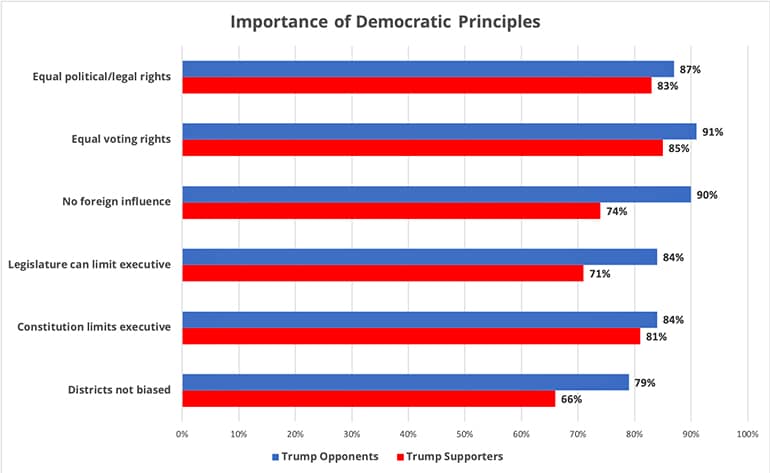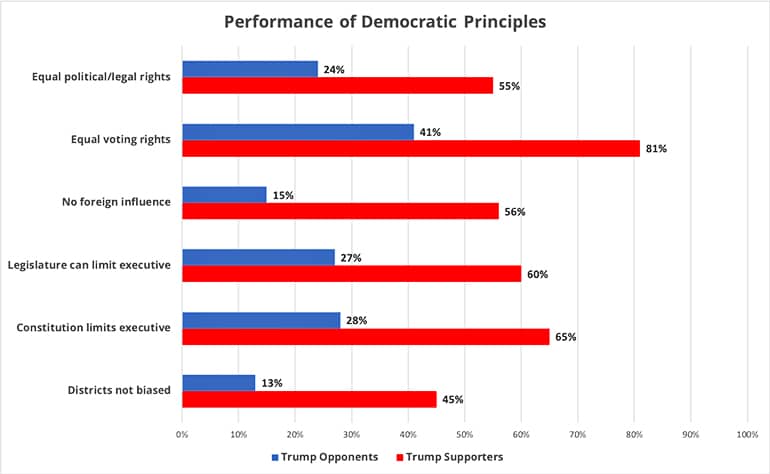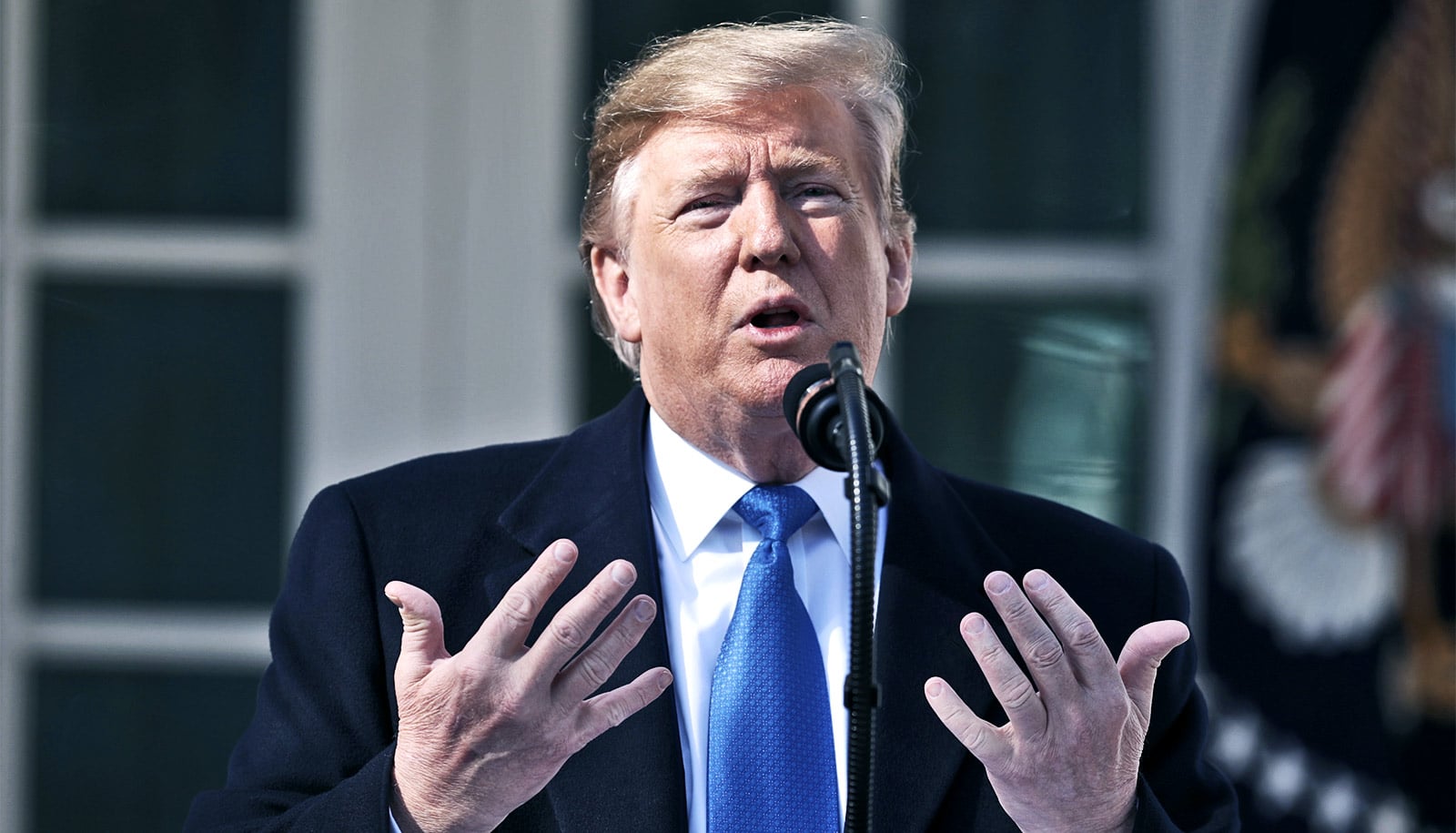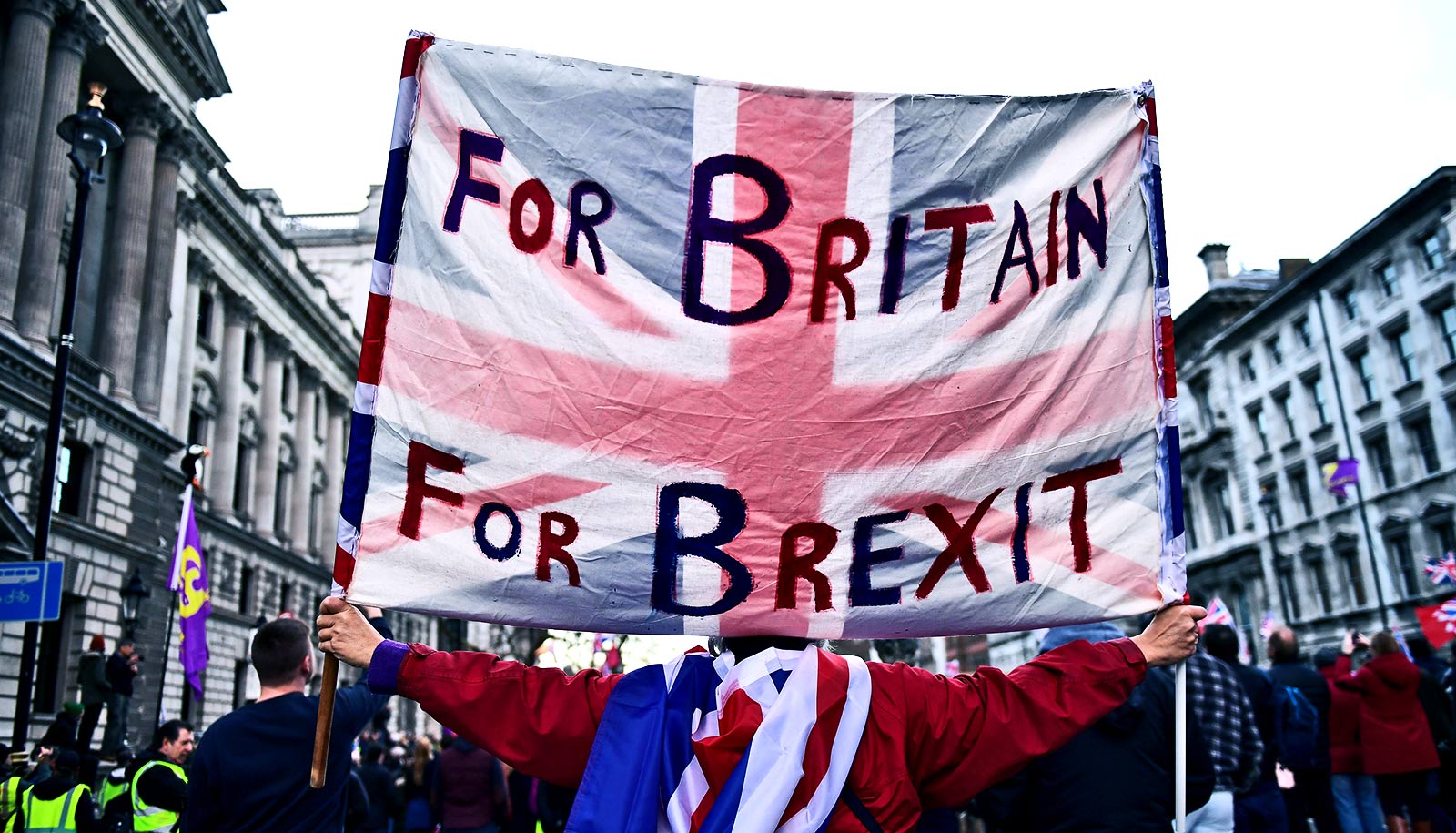Many Americans agree about critical democratic principles, but there’s much more disagreement over which, if any, have been violated, new research finds.
For the past year and a half, Bright Line Watch, a non-partisan group of political scientists, has been surveying the American public and their colleagues in academia in an effort to gauge the health of the nation’s democracy.
Over that time period, the watchdog group has published regular updates based on their quarterly surveys. Now, they offer the first comprehensive assessment of their findings in an article in the journal Perspectives on Politics.
The researchers examined whether the public and experts rate the importance of specific democratic principles in the same way, and the extent to which they share similar risk assessments to our basic political institutions.
Their findings?
If a healthy democracy requires “a consensus about which transgressions are critical and which more tolerable, our surveys are a source of optimism. We identify substantial areas of agreement about which transgressions matter most,” the team writes.
But a robust democracy requires something else. “It also needs broad agreement that leaders have transgressed against one or more important principles of democracy,” the researchers add. “By this measure, our evidence is far less encouraging.”
Democracy on the ropes?
While many may wonder if the nation’s democracy is in peril, the group cautions against any such sweeping conclusion. Instead, they argue, “it’s too early to know if the long-term quality of US democracy will suffer. Our political system and civil society retain formidable sources of resilience such as wealth and democratic longevity.”
But signs of potential degradation are everywhere, they warn. And they’re not always obvious. Backsliding, when it occurs, tends to be a slow erosion, rather than an obvious landslide, the scholars note.
“A key feature of democratic erosion, as opposed to, say, when democracies collapse by coup, is that the breakdown is gradual and piecemeal,” says Gretchen Helmke, a professor of political science at the University of Rochester.

“Not all institutions that support liberal democracy—for example, free and fair elections, checks and balances, the rule of law, and various first amendment protections—are necessarily targeted or challenged at the same time, or to the same degree.”
Moreover, previous research has shown that as public support for democracy is slipping, political leaders’ commitment to democratic norms may also be declining, together threatening the stability of liberal democracy. These threats are exacerbated by partisan polarization and authoritarian-populist movements in the United States and Europe, notes Bright Line Watch.
That’s why, according Helmke, it’s important to identify the institutions that sustain a democracy and monitor closely how each is stacking up.
Both consensus and division
The Bright Line Watch surveys consist of a two-part list of 27 statements of democratic principles that contribute to the overall stability and performance of American democracy. The first part asks citizens and experts to rate these democratic principles on how vital they are for democracy. The second part asks both citizens and experts how the US is performing on each of these principles.
Over the course of Bright Line Watch’s quarterly surveys that span the first 18 months of the Donald Trump presidency (the next round of surveys is slated for March), the team discovered that, to a surprising degree, both Trump supporters and opponents largely agree about which dimensions of democracy they value most: free and honest elections, the protection of equal voting, and equal political and legal rights. Institutional checks on executive authority and on the abuse of political power come next.

But when it comes to evaluating performance, the assessments begin to diverge. While the experts remain largely confident that US elections are clean and free of fraud, the public is more skeptical. On the flip side, while the public is confident that equal voting rights are effectively guaranteed, the experts aren’t so sure.
Over time, the political scientists note, the gulf in performance evaluations of democratic principles has grown wider between supporters and opponents of President Trump. On basic equality and fairness when it comes to legal rights, voting rights, and unbiased voting districts, Trump supporters give the United States high marks, while his opponents see democracy as seriously impaired.
Polarized opinions
Among the group’s goals was to identify theoretical “bright lines” that would cause widespread public opposition if leaders crossed them. While the team found large areas of agreement as to what exactly constitutes those bright lines, they also discovered a conundrum—there’s little agreement over which democratic principles have been violated.
Using their original data from the surveys of political science experts and the public they looked at a theory of how politicians may transgress limits on their authority and the conditions under which constraints are self-enforcing. Connecting this theory to the survey data, the researchers then identified potential areas of agreement—so called bright lines—among experts and the public about the most important democratic principles and whether they had been violated.
They conclude that although their surveyed experts perceived indeed a “substantial democratic erosion,” particularly in areas related to checks and balances, the “polarization between Trump supporters and opponents undermines any social consensus recognizing these violations.”
While there are many reasons why polarization hurts democracy, the team focused primarily on how polarization prevents the public from agreeing on what really constitutes a transgression against one or more of the core democratic principles identified in the research.
In practical terms, Helmke says, it means that “the more polarization there is, the harder it is for citizens to coordinate with one another to punish a leader for violating democracy.”
Here are Bright Line Watch’s key empirical findings:
- Although broad public consensus over democratic priorities remains, Americans are deeply divided over the quality of their democracy.
- That divide is growing.
- Experts and the public differ on many of the democratic principles they value most.
- The pace and sequence of US democratic erosion the polled experts identified over the last 1.5 years is similar to democratic backsliding in other parts of the world.
No public pushback
Why have events that provoked outrage from the media and academics alike not generated a greater public response? A simple answer that emerges from the data is that the disparity in outrage between elites and ordinary Americans mirrors some of the main differences the team finds over what constitutes democratic priorities.
“Our basic idea is that protecting democracy requires that citizens both agree on what matters and on whether transgressions are occurring. We call this a compound consensus,” explains Helmke.
“Interestingly, we see a lot of agreement among the public on what matters, but it is not necessarily what experts think matters most. So, even though the public may believe that the government is not performing particularly well in some of those areas most valued by experts, they do not necessarily share the same level of alarm as the experts.”
Possibly most worrisome, the team finds that the president’s supporters and detractors are increasingly drawing conclusions about the health of the US democracy that are “not merely disconnected, but reflect an increasingly different understanding of our political reality itself. In that context, any lines that can be drawn by the public in defense of democracy are likely to be hazy at best.”
Bright Line Watch also includes researchers from Meliora Research, Dartmouth College, the University of Michigan, and the University of Chicago.
Source: University of Rochester



